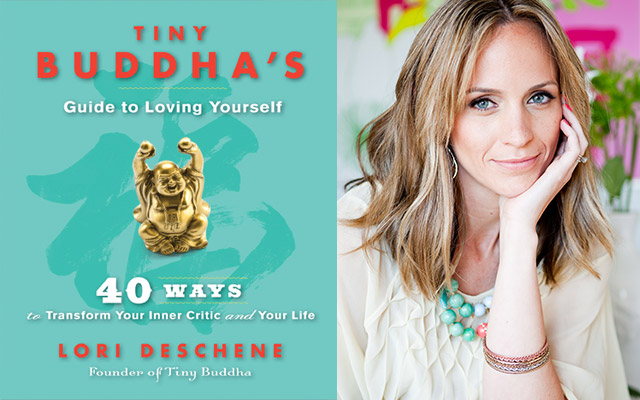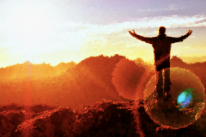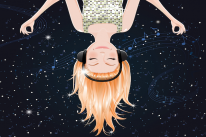
This month we’re celebrating the upcoming launch of Tiny Buddha’s Guide to Loving Yourself, a book about taming your inner critic that features 40 stories from Tiny Buddha contributors.
Throughout September, you’ll have a chance to meet some of them through daily interviews here on the blog.
Today’s featured contributor is Jennifer Chrisman, a psychologist, wife, and mother of two, who believes wholeheartedly in the healing power of compassion, tolerance, and human connection.
Her contribution for the book explores how we can stay connected to the belief that we deserve a life of love, instead of feeding our fears and insecurities.
A little more about Jennifer…
1. Tell us a little about yourself and your self-love journey.
I feel like I started this process at a very young age, always questioning my purpose, and trying to find the “solution” so that I could finally feel good about myself.
I went into the helping profession because I wanted to be an advocate and a role model for other young women, who may have been struggling with the same insecurities, fears, and addictions that I was, but deeper than that I think I was hoping that with enough therapy and education I would be able to heal myself.
My journey is an ever-evolving process. I tend to view myself as a recovering perfectionist, and for me that means allowing space in my life for all of myself, all of my experiences, the ups and the downs.
2. Have you ever felt there’s “something wrong with you”? If so, why, and what’s helped you change your perception?
I can remember as early as elementary school always feeling different from my peers. I was painfully shy and for me, to feel different meant to feel less than.
When I was 10 years old my father committed suicide, and while I think there was already groundwork being laid, that event solidified in my mind the evidence that I really wasn’t special or loved.
I spent the next two decades of my life trying to fix all of my flaws. I truly believed that if only I lost a little bit more weight, was just a little prettier, made a certain amount of money, earned the affection of certain people, then I would feel worthy of love.
Along the road, I lost the weight, I earned the degrees, I made the money, everything “looked” the way it was supposed to, but I still couldn’t tolerate being in my own skin because I still didn’t have any concept of self-love.
I didn’t know what it meant when people told me, “it’s an inside job.”
I think we all come to a point in our lives where we realize that something’s got to give, and for me that was the year my son was born. On the outside, my life looked perfect to everyone around me but on the inside I came to what would be considered my “bottom.” I felt like a secret and I felt like a fraud.
Today I believe that we are always provided with exactly what we need, when we need it, and that things change when we are ready to make change, and not a moment sooner!
A series of events led me to finding a spiritual solution, one that I was aware of and familiar with, but unwilling, up until that point to open myself up to. That is when I began to critically examine my faulty belief systems, to challenge my old ideas of how I thought things needed to be done, and how they should look, and to simply LET GO.
3. Have you ever thought something was a flaw only to realize that other people actually appreciate that about you? What was the “flaw”?
I used to think that to need anything from someone else was a flaw. I thought that any form of dependency was a weakness and I defended against it for most of life.
Unfortunately, there is no one among us that doesn’t have needs or can walk this path entirely on their own. When I began to get truly humble and ask others for help, it’s amazing how much love and support showed up in my life.
4. What was your biggest mistake (that you’re willing to share), and what helped you forgive yourself?
I genuinely do not believe there are any mistakes in my life, only opportunities. It has taken me a long time to come to this belief because I used to spend most of my time hiding in shame and believing, “if only I’d done things differently.”
Every single experience I have had in my life has led me to this exact moment, and right now I am exactly where I am supposed to be. I look at the darkest moments in my life, each of the “bad choices” as my sacred wounds. They needed to happen because there was something I needed to learn.
Finding forgiveness for those I believe harmed me and taking responsibility for my part in each of those experiences helps set me free from living with the bondage of having made “mistakes.”
5. Complete this sentence: When other people don’t like me, I…
…often times revert back to old thinking and obsess about what’s wrong with me, or what’s wrong with them, and what do I need to do to “fix” the situation.
I don’t think anyone ever really gets comfortable with the notion of not being liked. However, today, I’m able to, most of the time, bring myself back fairly quickly from the catastrophe I’ve spun in my head, to recognize that while it’s often times uncomfortable to not be liked, I don’t have to defend myself or change anyone’s opinion of me.
I’ve spent a lot of time on my self-love journey coming into recognition of, and acceptance of, those things that are within my power to change and those that are not.
Other people’s opinions of me are not within my power to change, and as is commonly said, are not even really any of my business.
6. What are some areas in your life where you’ve compared yourself to other people, and what’s helped you let go of these comparisons?
It can be very easy for me to play what I call, “The Compare and Despair” game because often what happens is I am comparing my internal experience to someone else’s external appearance, and those two will never measure up equally.
This shows up in almost all aspects of my life: motherhood, my career, my marriage, my body, etc. What I’ve come to realize for myself is that I just need to be willing to be honest and aware of myself when I’m doing it because it’s really just providing me with information.
I spend a lot of time and focus on creating space between myself and my thoughts, realizing that just because I have a thought, that doesn’t necessarily mean it’s true, and within this space I get to make adjustments when need be.
So, when I become aware that I’m playing the Compare and Despair game, it’s just information that there’s some part of my life that’s needing a little bit more “work,” often in the form of nurturing and loving attention.
7. What’s one thing you would tell your younger self about looking to other people to complete you?
Doesn’t really matter because I probably wouldn’t have listened! I needed to go through the experiences I did, to feel the pain and discomfort of those unhealthy dependencies, until I was ready to let them go.
8. Have you ever felt afraid to show people your “real” self? Why—and what’s helped you move beyond that?
I spent most of my life afraid of showing people the “real” me and I believe it’s because I didn’t know the real me. I was so consumed with being who I thought I was supposed to be that I never actually took the time to find me.
Accepting that I am powerless over other people and their opinions of me has given me the freedom to begin to explore and find myself and to stand by who that is.
9. What are the top three things you personally need to do to take good of yourself, mentally and emotionally?
My journey is a one-day-at-a-time process and it’s important for me to consistently remain active in my self-care practices; I can’t rely on what I did yesterday to take me through today.
Therefore, I start every morning with prayer and meditation, where I get centered and set an intention for myself and how I want to show up in my life. And then I need to get and stay connected.
I think community is really important and so I make it a point to surround myself with like-minded individuals that are encouraging and supportive. And finally, I need to move my body.
I’m dedicated to my yoga and Pilates practices and really value making conscious contact with my body through breath and movement.
10. What’s something you do regularly that makes you feel proud of the difference you’re making in the world?
Today, I consistently show up for my life. I’m no longer a secret, hiding behind my fears and insecurities. I believe that I walk with grace and dignity, right in the middle, where I’m supposed to be, no better than, or less than any other person trying to figure this life out.
I’m blessed to work with amazing clients and to be the mother to the two most incredible babies, and there is no doubt in my mind that the woman I am today, and the journey I am trudging, will make a difference in their lives, and countless other lives.
How exactly that is, I don’t really know, and so I’ll keep moving forward acting with integrity and smile on my face.
*Note: I edited this post to remove info about the pre-order promotion, which ended on October 8, 2013. You can learn more about Tiny Buddha’s Guide to Loving Yourself here.
About Lori Deschene
Lori Deschene is the founder of Tiny Buddha. She started the site after struggling with depression, bulimia, c-PTSD, and toxic shame so she could recycle her former pain into something useful and inspire others to do the same. You can find her books, including Tiny Buddha’s Gratitude Journal and Tiny Buddha’s Worry Journal, here and learn more about her eCourse, Recreate Your Life Story, if you’re ready to transform your life and become the person you want to be.
- Web |
- More Posts













 Though I run this site, it is not mine. It's ours. It's not about me. It's about us. Your stories and your wisdom are just as meaningful as mine.
Though I run this site, it is not mine. It's ours. It's not about me. It's about us. Your stories and your wisdom are just as meaningful as mine.
Thank you for this: “Along the road, I lost the weight, I earned the degrees, I made the money, everything “looked” the way it was supposed to, but I still couldn’t tolerate being in my own skin because I still didn’t have any concept of self-love.” First, it saves me the trouble of having to do all those things and learn this lesson the hard way : ) Also, it makes a lot of sense. And Lori – that new book looks beautiful.
Thank so much Liz! I also found that part–and so much of this interview–really helpful and inspiring!